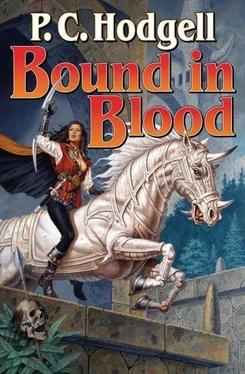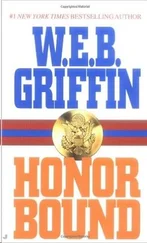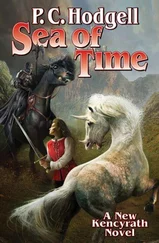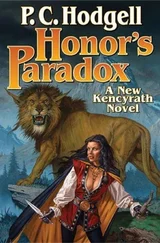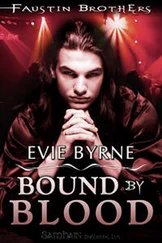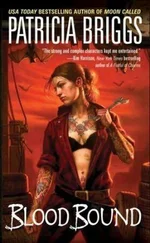At the far end of the table was a saddlebag, whose contents he knew only too well, having carried them from Kithorn all the way to the Cataracts. At the moment they lay in shadow, the declining sun not yet having sunk below the upper arch of the western window. Nonetheless, he sketched them a brief salute.
“It was the worst hunt yet,” he said, slumping back in the chair. “Just a few harts and hinds and, as you see”—with a jerk of his head to Yce, gnawing her prize in a corner—“the odd hare. Thanks to these damned folds in the land, we only seem to catch the very stupid or the very confused. At that, we’re lucky not to get lost ourselves.”
Marc offered him a dipper of water, then drank deep himself and absentmindedly emptied what was left over his head.
“You did notice, I take it, that yon pup has blood on her fur.”
“Yes, but it isn’t hers. She fought the direhounds for her treat, and won.”
Marc chuckled. “That sounds uncommonly like our lass. Have you had any word of her of late? I take it, at least, that the college is still standing.”
“If it weren’t, presumably someone would have told me.”
Torisen stirred uneasily. He didn’t like spies, and asking Harn Grip-hard to keep an eye on his sister felt too much like employing one. Just the same . . .
“All I’ve heard from Harn is ‘The weather is fine. Wish you were here.’ ”
“If Ran Harn wants you at Tentir, perhaps you should go.”
Harn couldn’t have meant that literally . . . could he? Maybe he had. The Knorth war-leader and sometime commandant of Tentir wasn’t inclined to be flippant. Moreover, something clearly had been bothering him to near distraction ever since Autumn’s Eve.
Observing that an hourglass on the window sill had run its course, Marc turned it over.
“Never mind,” he said, donning his gauntlets and hood. “Our lass can usually take care of herself, though she takes some getting used to.” He chuckled. “I wonder how my great-granddaughter Brier is doing. She’s a bit stiff in her ways—no surprise, given her history—but no doubt they’ll be good for each other.”
“Wait a minute. Brier Iron-thorn is your kin?”
“Not exactly, since we only trace bloodlines on the mother’s side. Still, right glad I was when you took her into your service at the Cataracts. She’ll do both of you proud.”
Marc opened the hatch on the northeast furnace to a rage of heat and light, reached in with tongs, and removed one of several clay firepots.
“Odd, though, about the hunt, I mean. By now the fall migrations should have begun. When the urge to go south hits, you’d think some beasties had lost their minds. Yackcarn, now, their migration from farther north is more like a month-long stampede. Only the females go. The males stay up above the snow line yearlong. You hear them bellowing in the spring mating session, but I don’t think anyone has ever seen one. The Merikit depend on the fall run of their female folk to survive the winter.”
Torisen pulled off a boot and shook a pebble out of it. The “pebble,” a baby trock, rolled into a corner and settled there, staring back at him with tiny, bright, unblinking eyes. Somehow, scavengers always survived. Ruefully, he studied the hole that the creature had gnawed in his sock. More work for Burr, unless he found time to darn it himself first. Luckily, the creature hadn’t yet started on his foot itself.
“Did . . . er . . . things ever get really bad of a winter at Kithorn?”
“Once, when I was a boy.”
Marc carefully poured the pot’s contents onto the flat blade of a long-handled clay paddle, one of several retrieved from the ancient glassworks in Gothregor’s abandoned halls along with the pots. The molten glass flowed like thick, incandescent honey, only covering two palms’ width. Strands of beard that had escaped the Kendar’s hood crinkled and burned with an acrid stench.
“The first melt can take up to sixteen hours,” he said, opening a slot in the second, southeastern furnace and sliding the paddle blade into it. “Fascinating stuff, glass. Did you know it’s basically just sand, lime, and ash, plus some coloring agent? Using cullet—the broken glass of the old window, that is—helps it melt at a lower temperature, although these turrets make natural chimneys and that coal burns something fierce. Huh. I’ll be needing to stoke this one soon, then let it cool to anneal the sheet.”
His smoked-glass eyes, when he turned, held the image of swirling, molten fire, but his voice flattened with sere reminiscence.
“That winter, now. It was hard. The harvest had been poor that year and the winter snows came early. When our supplies ran out, around Mid-Winter’s Day, we ate everything: bark, leather, frostbitten ears and toes. All the animals went, of course, except for the wise cats, who hid. The dogs licked our hands before we cut their throats.”
“And the horses?”
If he could have seen the Kendar’s expression, it would probably have been reproachful.
“We drew the line there in honor of our Whinno-hir except for those that dropped dead by themselves, which was most of them. They’ve no hair in their nostrils, y’know, to filter the cold air, and we had limited space in the keep. Lung infections took those that didn’t die first of hunger.”
“Why didn’t you ask one of the major houses for help?”
Shutting the slot, Marc opened another one below it and drew out a second pallet whose contents had flattened somewhat and spread into an irregular shape. This he slid onto a slab of stone used as a mazer and ironed it flatter still with a heavy metal rod, working quickly before it could cool.
“By the time we knew we needed aid,” he said over his shoulder, “it was too late. Besides, we were a cadet branch of the Caineron, the last to survive the Fall. Caldane’s father would have loved to snap us up, but we fancied our freedom, the same as the Min-drear do from the Knorth.
“Anyway, one bright, bitter day my little sister Willow was so hungry—how do you explain to a child that crying doesn’t help?—that I went out, cleared the snow off a patch in the spinney where I knew the loam was deep, set a fire, and thawed a patch of ground. It froze again almost as fast as I could hack it up, but I found enough roots, frozen worms, and hibernating bugs to make a thin gruel, which the poor thing promptly threw up. When I’d finally gotten her to bed—our parents were both dead by then, y’see—and came back to deal with the mess, someone had already licked the floor clean.
“Quick, now: where d’you think this piece fits?”
The small sheet was still strangely shaped, and strangely colored now that it had begun to cool, with veins of shimmering red that ran through dull green into dusky purple.
Torisen rose to look more closely. “I don’t remember anything like that in the old window.”
“Iron and nickel, I’d say,” said Marc, thinking out loud. “They create that verdigris color sometimes, like the undersides of clouds before a bad storm. The red comes from gold, believe it or not. At a guess, these are streams washing gold dust down to the Silver. It’s a bit of the Riverland, anyway.”
He picked it up with his gauntleted hands, supporting its still malleable shape, and transferred it to the table. Other bits of finished glass dotted the tabletop, roughly where Torisen thought the Riverland should be.
“Move that sack, lad.”
Marc indicated which one with a jerk of his chin, and Torisen snatched it up. The Kendar placed his fragment next to first one, then another of similar hue. As he fiddled with them, Torisen opened the sack and stirred its contents with a long finger. Ground, greenish quartz, bits of rough, dark stone with flecks of iron in it, limestone, a grain of gold, a tiny fern frond that crumbled to ash at his touch . . .
Читать дальше
